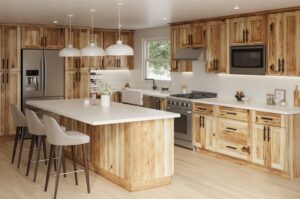The Complete Guide to an Industrial Kitchen: Design, Features, and Benefits

An industrial kitchen is the backbone of commercial food preparation, offering high efficiency, durability, and functionality. Whether it’s a bustling restaurant, a large catering operation, or a food production facility, an industrial kitchen is designed to handle heavy workloads and deliver consistent results. In this article, we’ll explore everything you need to know about industrial kitchens—from their design and features to their many benefits.
What Is an Industrial Kitchen?
An industrial kitchen is a large-scale cooking environment designed for commercial food production. Unlike residential kitchens, which focus on aesthetics and convenience for personal use, industrial kitchens are engineered to meet the high demands of professional food service establishments. These kitchens prioritize functionality, durability, and health and safety standards compliance.
Industrial kitchens are standard in a variety of settings, such as:
- Restaurants and hotels
- Catering businesses
- Hospitals and schools
- Food manufacturing facilities
- Event venues
Industrial kitchens are an essential component of the food service industry because they can handle high-capacity cooking and complex workflows.
Key Features of an Industrial Kitchen
An industrial kitchen is equipped with specialized features to maximize productivity and efficiency. Below are some of the essential components that make up a functional industrial kitchen:
1. Heavy-Duty Equipment
Industrial kitchens rely on heavy-duty appliances designed to withstand rigorous use. Examples include:
- High-capacity ovens and stoves
- Commercial-grade refrigerators and freezers
- Industrial mixers and blenders
- Dishwashers with rapid cycles
- Large-scale fryers and griddles
These appliances are built for long-lasting performance, making them ideal for continuous use in high-demand environments.
2. Ample Storage Space
Proper storage is critical in an industrial kitchen. With large quantities of ingredients and supplies to manage, these kitchens feature:
- Walk-in refrigerators and freezers for bulk storage
- Shelving units for dry goods
- Secure storage for knives and other sharp tools
- Designated areas for cleaning supplies and chemicals
Efficient storage solutions not only keep the kitchen organized but also ensure that food safety standards are maintained.
3. High-Quality Ventilation
Ventilation is a key aspect of industrial kitchen design. Cooking at scale generates significant heat, smoke, and grease, making the environment uncomfortable and unsafe. Industrial kitchens typically include:
- Exhaust hoods with robust ventilation systems
- Grease filters to reduce buildup
- Ductwork designed for efficient airflow
Proper ventilation promotes a safer and more comfortable working environment for kitchen staff.
4. Durable Surfaces
Industrial kitchens require work surfaces that can handle heavy use without showing wear and tear. Stainless steel is the material of choice for most industrial kitchen surfaces due to its durability, resistance to corrosion, and ease of cleaning. Stainless steel countertops, prep tables, and sinks are standard features in these kitchens.
5. Compliance with Health and Safety Standards
Every industrial kitchen must adhere to strict health and safety regulations. This includes:
- Non-slip flooring to prevent accidents
- Adequate lighting for food preparation
- Proper waste disposal systems
- Regular inspections and cleaning protocols
Compliance ensures that the kitchen operates safely while meeting legal requirements.
Benefits of an Industrial Kitchen
An industrial kitchen offers numerous advantages for food service establishments. Let’s take a closer look at some of the key benefits:
1. High Efficiency
Industrial kitchens are designed to streamline workflows and maximize productivity. With specialized equipment and organized layouts, chefs and kitchen staff can work efficiently, even during peak hours.
2. Scalability
Industrial kitchens provide the capacity to scale up production without compromising quality for businesses that need to prepare large quantities of food. This is essential for catering companies, banquet halls, and food manufacturing facilities.
3. Durability
The materials and equipment used in industrial kitchens are built to last. This durability minimizes the need for frequent repairs and replacements, ultimately saving businesses money in the long run.
4. Improved Food Safety
Industrial kitchens help reduce the risk of contamination and foodborne illnesses by providing proper sanitation stations, food-grade surfaces, and adherence to health codes. This ensures that customers receive safe, high-quality meals.
5. Customization
Industrial kitchens can be customized to suit a business’s specific needs. Whether incorporating specialized equipment or designing an ergonomic layout, these kitchens can enhance operations.

Designing the Perfect Industrial Kitchen
Creating an efficient and functional industrial kitchen requires careful planning and design. Here are some key considerations when designing an industrial kitchen:
1. Layout and Workflow
The layout of an industrial kitchen plays a significant role in its efficiency. The kitchen should be divided into specific zones, such as:
- Prep area
- Cooking area
- Cleaning area
- Storage area
The goal is to create a workflow that minimizes unnecessary movement and allows staff to work efficiently.
2. Energy Efficiency
Investing in energy-efficient appliances and lighting can significantly reduce operating costs. Look for equipment with ENERGY STAR ratings and incorporate LED lighting to lower energy consumption.
3. Space Optimization
An industrial kitchen should make the best use of available space without feeling overcrowded. This involves choosing appropriately sized equipment and ensuring enough room for staff to move freely.
4. Health and Safety Compliance
Working with professionals who understand local health and safety regulations is essential when designing an industrial kitchen. This ensures that the kitchen meets all legal requirements and passes inspections.
Challenges of Operating an Industrial Kitchen
While industrial kitchens offer many advantages, they also come with challenges that operators must address:
1. High Initial Costs
Setting up an industrial kitchen can be expensive due to the cost of commercial-grade equipment and materials. However, these initial costs are an investment in the business’s long-term success.
2. Maintenance Requirements
Regular maintenance is essential to keep an industrial kitchen running smoothly. This includes cleaning grease traps, servicing appliances, and inspecting ventilation systems.
3. Staff Training
Operating an industrial kitchen requires trained personnel who understand how to use the equipment safely and efficiently. Providing ongoing training is essential for maintaining high standards.
The Future of Industrial Kitchens: Trends to Watch
The industrial kitchen industry constantly evolves to meet consumer demands and technological advancements. Some trends shaping the future of industrial kitchens include:
- Automation: Smart appliances and robotics are increasingly being used to streamline food preparation and cooking tasks.
- Sustainability: Eco-friendly practices, such as waste reduction and energy-efficient equipment, are becoming more prevalent.
- Modular Designs: Modular kitchens offer flexibility and scalability, allowing businesses to adapt to changing needs.
- Integration of Technology: Digital systems for inventory management, order tracking, and kitchen automation are transforming how industrial kitchens operate.
Conclusion
An industrial kitchen is a vital asset for any food service business. It offers the efficiency, durability, and scalability needed to handle large-scale food production. By investing in high-quality equipment, thoughtful design, and proper maintenance, businesses can create a kitchen environment that supports operations and delivers exceptional results.Whether starting a new restaurant, expanding a catering business, or modernizing a food production facility, understanding the fundamentals of industrial kitchens will help you make informed decisions. With the proper planning and resources, your industrial kitchen can become the cornerstone of your business’s success.







